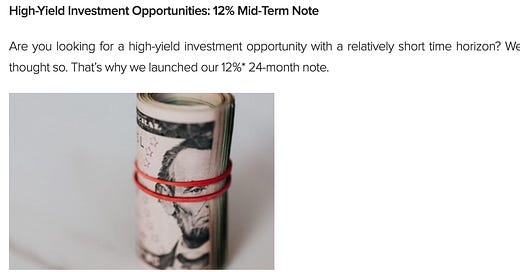Hi! It’s George from Investorama, your guide to the future of investing - without the hype.
This is the newsletter where I fully embrace my inner grumpiness, or maybe it’s a way to atone for past sins.
I am a recovering banker and marketer. I used to manufacture and sell investment products to institutional clients at Deutsche Bank, mainly alternatives and structured products. Often they would sell them on, taking a cut in the process.
One way of explaining the job is to say I was presenting clients with investment opportunities. Another way is to say that I was maximizing the margin for the bank (and telling friends and family not to buy any of them).
With the TIPs series, I will distil whatever I learnt in over a decade of pricing, structuring, and packaging investment products.
Every month or so, I will present and break down selected TIPs. But I’m not judging them by their potential outcome. No, my criteria are the way they are marketed or mis-sold.
#1 Tellus
Former podcast guest Jason Mikula inspired this introductory series with this tweet:


Tellus starts its pitch with a powerful statement:
Turn your savings into passive income.
If you need to be very active to generate income from your savings, change banks.
But Tellus is not a bank. They don’t offer deposits. This is a residential real estate play that they compare with FDIC-insured savings accounts. The risks are perfectly summed up in Jason’s tweet. I won’t add anything else, except that if you’re into Fintech, you should subscribe to his newsletter:
#2 Supervests 12%*Mid-Term Note
Supervest offers a 12%* note, the asterisk points to:
*It is essential to note that the 12% return is a target return and cannot be guaranteed. As with all investments, returns will vary based on the market, industry, and other risk factors.
The note's term is 24 months, and I have read the page a few times but can’t figure out if the 12% is per annum or at maturity. 12% is a “target return”, so I guess it’s the former, but that doesn’t matter anyway because it’s just a number that nobody’s accountable for.
But the fact that it is a “target” makes me think it’s probably a maximum return, if everything is fine.. There is no floor, however, on the downside.
The whole page is a caricature of lousy marketing. I can’t highlight all of it, but I particularly enjoyed how they list “diversification” and “low correlation” as two distinct features (For the avoidance of any doubt, if the correlation is high, there are no diversification benefits).
The assets are fleetingly mentioned: Merchant Cash Advance. Maybe it’s a good idea? I don’t know. But I know that based on the pitch, this is a Terrible Investment Product.
I’ll be back next week with more on financial fraud…
Hope you enjoyed this new format. If it’s been forwarded to you and you want to receive it directly in your inbox, subscribe here.
If you’d like me to review an investment product that you consider or would like to share a T.I.P., please hit reply. Thanks




